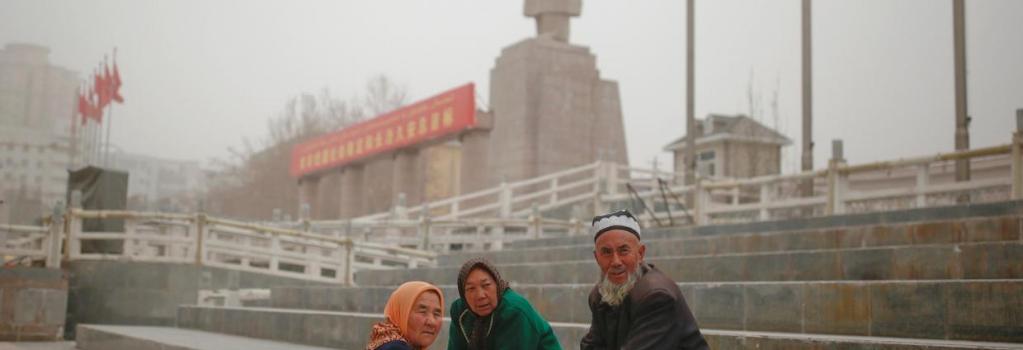The country is ‘essentially creating a police state of unprecedented scale,’ says James Liebold, an expert on Chinese security at Australia’s La Trobe University
Muslims in China are increasingly living under a “police state”, experts have warned, after the country’s communist government imposed a series of sweeping counter-terrorism measures.
The Xinjiang province in the far west of the country is the homeland of the Uighurs, a traditionally Muslim group who say they face discrimination.
Recent years have seen bloody clashes in the region, which the Chinese government blames on Islamist militants and separatists.
But rights groups say the unrest is more a reaction to repressive policies, and argue that the new measures may end up pushing some Uighurs into extremism.
Just last week, hundreds of Uighurs were detain as they returned from overseas pilgrimages, according to Radio Free Asia.
“There is a huge crackdown in Xinjiang,” a rights lawyer, who did not wish to be named, told the station.
They claimed that courts across the region are being ordered by the ruling Chinese Communist Party to “deal with” anyone engaging in any form of illegal religious activity.
Tensions in the region go back many years. Uighurs are ethnically Turkic Muslims, making up around 45 per cent of the population. Around 40 per cent are Han Chinese.
The region has had intermittent autonomy and occasional independence, but what is now known as Xinjiang came under Chinese rule in the 18th Century.
Open support for separatist groups increased after the collapse of the Soviet Union in the 1990s and the emergence of independent Muslim states in Central Asia, but Beijing suppressed demonstrations and activists went underground.
Many say that ethnic tensions caused by economic and cultural factors are the root cause of the recent violence.
Major development projects brought prosperity to Xinjiang’s big cities, attracting young and technically qualified Han Chinese from eastern provinces.
But it was said they were given the best jobs and the majority do well economically, something that has fuelled resentment among Uighurs.
Activists also say Uighur commercial and cultural activities have been gradually curtailed by the Chinese state.
Earlier this year, China introduced measures prohibiting “abnormally” long beards, the wearing of veils in public places and refusing to watch state television.
The laws also banned not allowing children to attend government schools, not abiding by family planning policies, deliberately damaging legal documents and marrying using only religious procedures.
Schools reportedly discourage students from using the traditional Arabic Muslim greeting “As-Salaam Alaikum” (“peace be upon you”), with the Government anxious to discourage what it views as the “separation” of the Muslim world from mainstream Chinese society.
It followed a call from Chinese Premier Xi Jinping to build a “great wall of steel” to safeguard the region after a group of Uighurs, claiming to belong to a division of Isis, reportedly threatened they would return to China and “shed blood like rivers.”
The crackdown has been felt in the region’s biggest city, Kashgar, where activities in mosques are closely monitored. A live feed from inside them is reportedly beamed onto screens in police stations.
Plainclothes officers wearing Communist Party pins and dark glasses are also said to attend the mosques to keep an eye on their activities.
Signs around the province warn people that “the greatest task to Xinjiang’s masses is harmonising ethnic unity and religion.”
A Local businessmen told the South China Morning Post the Government used the multiple checkpoints which surround the city to prevent travellers from joining in with prayers for the Islamic festival of Eid, with armed officials on guard.
As a result James Leibold, an expert on Chinese security at Australia’s La Trobe University, told the Agence France Press that the country is “essentially creating a police state of unprecedented scale.”
Amnesty International also warned in a report earlier this year, that proposed amendments by the Chinese Government to the Regulation of Religious Affairs could be used “to further suppress the rights to freedom of religion and belief, especially for Tibetan Buddhists, Uighur Muslims and unrecognised churches.”
But Wang Hongwei, a national security expert at Beijing’s Renmin University, told The Guardian earlier last month that there was no sense in the the government’s minds “that anything that they are doing is necessarily part of the problem.”
He said: “It is the sense that the more troops you can have, the more security checkpoints, then that is the way to keep going.”
He added that the “high-pressure crackdown” was designed to intimidate Islamist militants who threatened China’s national and political systems.
Source: independent.co.uk

Leave a Reply